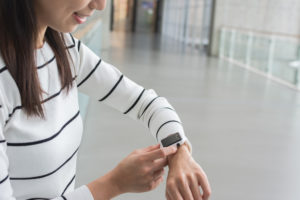
We’ve all experienced “Paper Ticket Syndrome” at some point. You’re on your way to an exciting event that you’ve been looking forward to for ages, perhaps a soccer match or a music concert, and the train and event tickets in your pocket don’t feel quite secure enough. Then, when you get to the entrance you find yourself fumbling for your wallet, frustrating the long queue behind you. Wouldn’t it be great if a cure could be found; a simple, secure and convenient way to gain entrance to a station or an event? A solution to Paper Ticket Syndrome is needed desperately, especially with an exciting summer of sport ahead, featuring busy events like Euro 2016, the Olympics and Paralympics.
Don’t worry, though, Paper Ticket Syndrome is finally on the brink of being banished. On transport systems across the world, the rise of contactless cards such as London’s Oyster and Hong Kong’s Octopus have enabled travelers to move quicker than ever before by simply tapping their cards against a reader. It’s much more convenient for passengers, who don’t have to buy lots of paper tickets. All they need to do is top up their card and enjoy moving around cities with ease.
The contactless revolution isn’t restricted to cards either. As our #MyNFCDay video series showed, people are also using their smartphones to enter train stations and get on the bus. So, what’s next for treating Paper Ticket Syndrome?
The future of NFC payments lies with wearables. As we’ve discussed on the blog, wearables are getting more powerful, popular and practical. Recent research suggests the wearables market could be worth as much as $25 billion by 2019, and it makes sense for transport systems to provide for these devices. In London, travelers can already use Apple Pay on their Apple Watches to access the tube, as well as Barclaycard’s payment wristbands.
Across the Channel, Lille is launching the Calypso ticketing bands, the world’s first commercial contactless transport ticket wristbands, which are being sold during Euro 2016. With 300,000 visitors expected for the soccer tournament, it’s vital Lille doesn’t become a hotbed of Paper Ticket Syndrome. Thankfully Transpole, the local transport network, has addressed the issue by accepting wristband ticketing solutions, which are easy to use and top up. The Gemalto-manufactured devices aren’t just making travel more seamless; they also have the capability to be combined with other services, such as merchandise payments and stadium access. The wristbands will also encourage supporters to travel to the city’s dedicated ‘fan zone’ in the city center and contribute to a vibrant atmosphere. Better still, the wristbands can be used after the event to ensure a quick and easy transport experience around the city.
It’s not just Euro 2016 embracing NFC payments, though. Visa are ensuring that ‘Team Visa’ athletes at the Olympic Games will be equipped with special NFC-enabled rings, allowing them to make purchases around the city with a tap of the finger. With Visa rolling out 4000 NFC terminals across Olympic venues, the athletes will be spoiled for choice. With “One Ring to Rule Them All”, these athletes are set to defeat Paper Ticket Syndrome comprehensively, although we hope they don’t become targets for Sauron.
What do you think about the rise of NFC payments, the fight against Paper Ticket Syndrome and the impact on transport? Let us know by tweeting to us at @GemaltoMobile, or by posting a comment below. Enjoy the summer of sport – and ditch those paper tickets!


